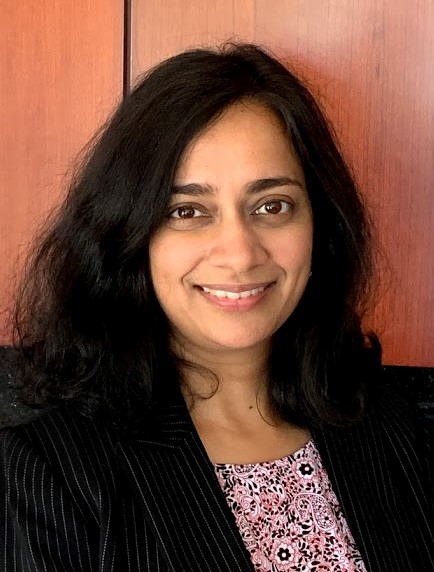Krupa Ramasesha
Principal Member of Technical Staff

Biography
Krupa Ramasesha is a Principal Investigator at Sandia National Laboratories, Livermore, where she is leading a research program investigating ultrafast dynamics in gas phase and condensed phase systems, funded by the DOE/BES Gas Phase Chemical Physics Program and the Laboratory-Directed Research and Development Program. Her research interests lie in exploring photoinduced energy transfer and excited state dynamics governing bond dissociation, conformational changes, and charge transfer on femtosecond to picosecond time scales. She received her B.S. in Chemistry from the University of Wisconsin-Madison, where she studied solution-phase photoisomerization and bimolecular reaction dynamics using transient UV/Vis absorption spectroscopy in Prof. Fleming Crim’s group. She then moved to the Massachusetts Institute of Technology for her Ph.D., where she worked with Prof. Andrei Tokmakoff investigating hydrogen bonding and proton transfer dynamics using ultrafast broadband multidimensional infrared spectroscopy. She performed her postdoctoral work at the University of California, Berkeley, in Prof. Steve Leone and Prof. Dan Neumark’s groups studying electron dynamics in semiconductors via attosecond soft X-ray spectroscopy and at Sandia National Laboratories with Dr. David Osborn investigating chemical reaction kinetics using synchrotron-based multiplexed photoionization mass spectrometry, prior to starting her independent career.
Education
Bachelor of Science (B.S.) in Chemistry (Honors), University of Wisconsin-Madison
Doctor of Philosophy (Ph.D.) in Physical Chemistry, Massachusetts Institute of Technology
Selected Awards and Honors
| Fulbright-NAWI Graz Visiting Professorship / Fulbright U.S. Scholar Award |
| U.S. Department of Energy Early Career Research Award |
| The Journal of Physical Chemistry/Americal Chemical Society Physical Chemistry Division Lectureship |
| Lester Wolf Graduate Fellowship, MIT Department of Chemistry and G. R. Harrison Spectroscopy Laboratory |
| MIT Presidential Graduate Fellowship |
| American Chemical Society Daniel Shirk Award for Outstanding Undergraduate Research, UW-Madison |
| Wisconsin Section American Chemical Society Award for Excellence in Physical Chemistry, UW-Madison |
Research Interests
Dr. Ramasesha’s research interests lie in investigating chemical transformations in gas phase and condensed phase systems on ultrafast timescales using a wide array of experimental methods. Her team is pursuing research in the following areas:
- Ultrafast Photodissociation and Charge Transfer Dynamics in Gas Phase Molecules:
Funded by the BES Gas Phase Chemical Physics Program, this effort focuses on investigating electronic, structural, and vibrational dynamics in gas phase systems with the goal of understanding excited state pathways that dictate the fate of photoexcited molecules. Research themes for this effort include the study of excited state dynamics in molecules that exhibit strong spin-orbit coupling and complex nuclear wavepacket dynamics such as organometallic molecules, biochromophores such as organic heterocycles and disulfide-containing systems, as well as atmospherically relevant molecules. Her team applies a diverse array of ultrafast experimental techniques sensitive to both electronic and atomic motion, such as ultrafast soft X-ray core-level spectroscopy using in-house table-top high harmonic generation, ultrafast broadband infrared spectroscopy, and ultrafast electron diffraction at SLAC MeV-UED.
- Ultrafast Interfacial Charge and Energy Transfer:
Funded by the DOE Early Career Research Program within BES Gas Phase Chemical Physics, Dr. Ramasesha’s team is investigating non-equilibrium electronic interactions between plasmonic metals and molecules, which forms the foundation for developing predictive understanding of sensing and catalysis driven by photoexcitation. Work in this project studies ultrafast interfacial charge and energy transfer dynamics between photoexcited plasmonic and catalytic metals and adsorbed molecules using ultrafast UV/visible spectroscopy, ultrafast infrared spectroscopy and ultrafast XUV spectroscopy. These techniques promise to yield site-specific information on the metal and molecular responses to photoexcitation, allowing detailed insights into the mechanisms for charge and energy transfer and their dependence on excitation mode as well as molecular properties.
- Ultrafast Energy and Charge Transfer in Molecular Solids:
Funded by the Laboratory-Directed Research and Development Program, the team’s condensed phase efforts involve investigations of ultrafast vibrational energy transfer in energetic materials and ultrafast intermolecular charge transfer in organic co-crystals. The project on energetic materials aims to unravel the detailed energy transfer processes and vibrational coupling between high frequency molecular vibrations and delocalized lattice phonon vibrations that dictate the crucial first steps following shock wave excitation of the solid. These experiments are performed under ambient pressures as well as under static pressure loading in a diamond anvil cell as a means to control molecular packing and the strength of intermolecular interactions. These studies employ a laser-driven plasma-based source of ultrabroadband infrared pulses that span the mid-infrared region to provide a global view of the ultrafast vibrational dynamics. The project on organic co-crystal materials is led by Laura McCaslin, where the team experimentally studies the femtosecond to nanosecond excited state dynamics following charge transfer excitation in a variety of donor-acceptor co-crystals using ultrafast UV/visible transient absorption spectroscopy.
Active collaborations with theorists on all of these efforts enable interpretation of experimental results, provide crucial experimental benchmarks for high-level theoretical methods, and strengthen our overall understanding.
Publications
Selected Professional Service Activities
| Editorial Advisory Board, The Journal of Physical Chemistry A/B/C | 2026-2028 |
| User Committee, NSF National eXtreme Ultrafast Science (NeXUS) facility | 2025-2028 |
| Editorial Advisory Board, The Journal of Chemical Physics | 2023-2025 |
| Editorial Advisory Board, The Journal of Physical Chemistry A/B/C | 2023-2025 |
| International Advisory Committee of the International Symposium on Molecular Spectroscopy | 2022-2025 |
| American Physical Society | |
| American Chemical Society |
Conference Organization
- “Spectroscopy Meets Chemical Dynamics” mini-symposium at the International Symposium for Molecular Spectroscopy, June 2022, Urbana, IL
- National Science Foundation workshop on “Addressing Challenges in Ultrafast Photochemistry and Photocatalysis: Opportunities for Theory and Experiment”, October 2025, Alexandria, VA
- “Nonadiabatic Chemical Dynamics – Theory and Experiment” Focus Session at the American Physical Society Global Summit, March 2026, Denver, CO
- “Power Hour” at the Gordon Research Conference on Multiphoton Processes, June 2024, Smithfield, RI
